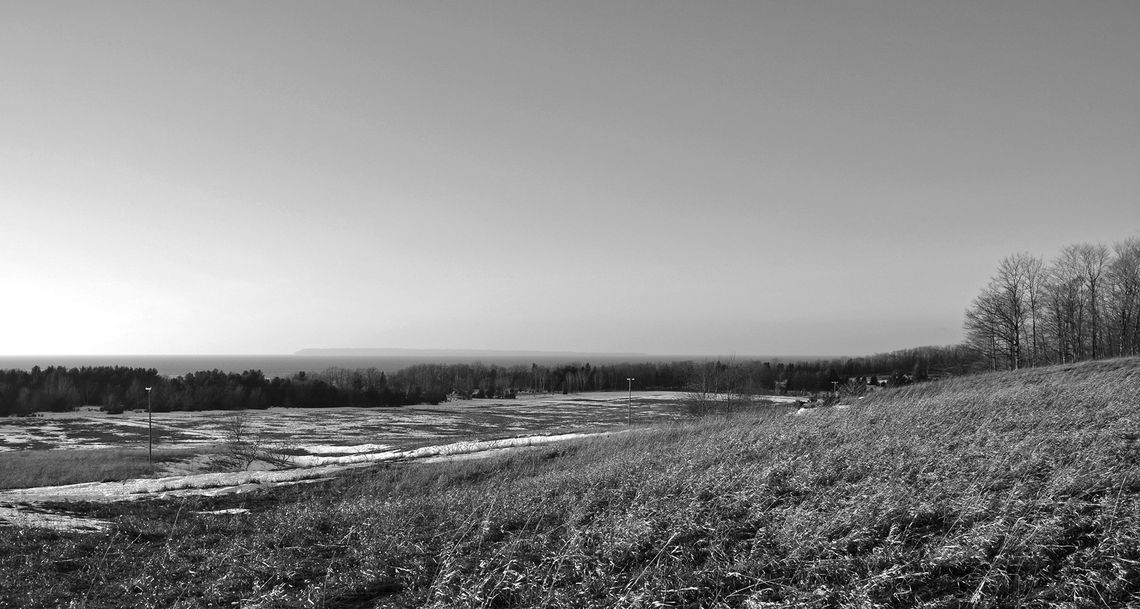This continues a series adapted from the book, “A Port Oneida Collection,” Volume 1 of the twopart set, “Oral History, Photographs, and Maps from the Sleeping Bear Region,” produced by Tom Van Zoeren in partnership with Preserve Historic Sleeping Bear. Here we continue with a look at the old Warner Farm, which was along Thoreson Road across from the Thoreson Farm.
August Warner, the “bastard” son of Katie Poertner discussed in the previous installment, grew to manhood in Port Oneida, married Rosie Haas of South Manitou Island, and during the early decades of the 1900s built a new farm along Thoreson Road. Many years later, his grandson, Gene Warner, recalled a visit to the old farm: My Dad and I never got along well. During the first five or six years of my life, he was at sea (WW II) and when he came back he decided that I’d been raised by “those goddamned Kelderhouses” (my mother’s side of the family). We therefore rarely did anything together, or spoke to each other. He hardly ever spoke about his early life to anyone, anyway. But when I was about sixteen (1956), for some reason he decided to take me “up north” deer hunting. My grandparents, August and Rosie Warner, were then living in Glen Haven, so it was as much of a visit as a hunting expedition.
One day we got into the car, and he drove over towards Port Oneida, then turned off on a back road (Thoreson Rd), and finally into the yard of an old farm. The place was occupied by a couple of old guys he called “the Brammer brothers.” (I’ve forgotten their first names.) He seemed to know them quite well and sat there in their kitchen talking over old times for a couple of hours. The place was really rustic and drafty. It put me in mind of places seen on the old “Gunsmoke” TV series. I went out for a little while and walked around the farmyard, which also looked quite run-down, not seeing any livestock or any other signs of farming activity.
After we left, my dad told me that the Brammer brothers didn’t do any farming, they just did logging in the nearby woods. Then he told me that this was the farm he’d grown up on as a boy. His parents, August Warner and Rosie Haas, located there after being married, courtesy of Grandpa Warner’s mother. They lived there until about 1922, when August won the mail contract for South Manitou, at which time they moved over to South Manitou.
My understanding was that the farm had come as a wedding gift. From what I recall from walking around the place fifty years ago, and several times since, it wouldn’t have been much of a gift so far as farms go. It seemed small, hilly and rocky. My dad never talked about his childhood and, in fact, until that day, I’d always thought he’d been born and brought up on the island. The few early pictures of his family never show anybody with a smile on their face; to the contrary, they always look defeated and unhappy. So I expect that life on that farm was cruel, and they were probably consistently dirt poor. I doubt that Grandpa Warner was much of a farmer anyway. He was never known for making a go of anything— wood chopper, farmer, mail boat operator, fisherman (three boats, at one time), fisheries purchasing agent, county commissioner, school board president, and finally “Constable” on South Manitou (appointed, I think, by Mr. Boales, as sort of a joke.) But whatever else he was, he was evidently a likable fellow.
Once when my younger sister was having marriage problems, Grandma Warner, trying to share that marriage involves commitment and steadfastness, even through the times when it isn’t as heavenly as shown in the movies, told her that August often fell short; that, for example, there were times when he’d hitch up the horse and head to Glen Arbor, taking what little money they had to buy the few essentials they could afford. But towards the end of the day, the horse would come back by itself with the wagon in tow, but no August. She’d then bundle up the kids and load them into the wagon, and go into Glen Arbor to get Grandpa out of the tavern. The money was all gone by then, of course, having been blown on beer in the tavern. I can still hear her say, and without regret, “August had a lot of faults too, Janet. But he was my man.”
I remember being able to look out the window while sitting there that day at the Brammer brothers’ kitchen table, having a clear view of South Manitou off in the distance. The tree line that blocks that view now was not there then. I’ve often wondered how many times Grandma Warner looked out that same window at that same view, seeing the island where all her kin, all the Hutzlers and Haases, were living happily, healthily, and prosperously together, and wishing she was back over there. She must have been happy in 1922, when that wish finally came true.








